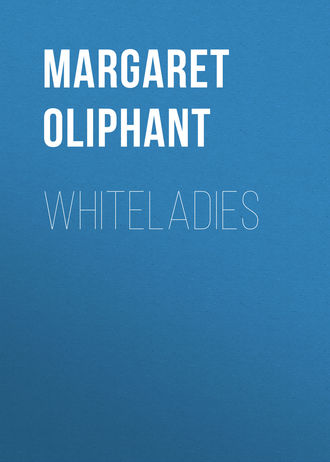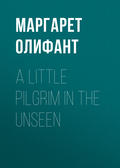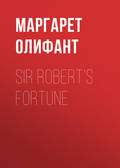
Маргарет Олифант
Whiteladies
CHAPTER XLIV
What a dismal conclusion it was of so merry a day! Herbert walked into the house, leaning upon Everard’s arm, and when some wine had been administered to him, declared himself better, and endeavored to prove that he was quite able to join them at supper, and that it was nothing. But his pale face and panting breast belied his words, and after awhile he acknowledged that perhaps it would be best to remain on the sofa in the drawing-room, while the others had their meal. Reine took her place by him at once, though indeed Sophy, who was kind enough, was ready and even anxious to do it. But in such a case the bond of kin is always paramount. The doctor was sent for at once, and Everard went and came from his guests at the dinner-table, to his much-more-thought-of guests in the cool, silent drawing-room, where Reine sat on a low chair by the sofa, holding her brother’s hand, and fanning him to give him air.
“All right, old fellow,” poor Bertie said, whenever Everard’s anxious face appeared; but when Reine and he were left alone, he panted forth abuse of himself and complaints of Providence. “Just as I thought I was all right – whenever I felt a little freedom, took a little liberty – ”
“Oh, Bertie,” said Reine, “you know you should not have done it. Dear, don’t talk now, to make it worse. Lie still, and you’ll be better. Oh, Bertie! have patience, have patience, dear!”
“To look like a fool!” he gasped; “never good for anything. No – more – strength than a baby! and all those follows looking on.”
“Bertie, they are all very kind, they are all very sorry. Oh, how can you talk of looking like a fool?”
“I do,” he said; “and the girls, too! – weaker, weaker than any of them. Sorry! I don’t want them to be sorry; and old Farrel gloating over it. Oh, God! I can’t bear it – I can’t bear it, Reine.”
“Bertie, be still – do you hear me? This is weak, if you please; this is unlike a man. You have done too much, and overtired yourself. Is this a reason to give up heart, to abuse everybody, to blaspheme – ”
“It is more – than being overtired,” he moaned; “feel my heart, how it goes!”
“Yes, it is a spasm,” said Reine, taking upon her a composure and confidence she did not feel. “You have had the same before. If you want to be better, don’t talk, oh, don’t talk, Bertie! Be still, be quite still!”
And thus she sat, with his hand in hers, softly fanning him; and half in exhaustion, half soothed by her words, he kept silent. Reine had harder work when the dinner was over, and Sophy and Kate fluttered into the room, to stand by the sofa, and worry him with questions.
“How are you now? Is your breathing easier? Are you better, Bertie? oh, say you are a little better! We can never, never forgive ourselves for keeping you out so late, and for letting you tire yourself so.”
“Please don’t make him talk,” cried Reine. “He is a little better. Oh, Bertie, Bertie, dear, be still. If he is quite quiet, it will pass off all the sooner. I am not the least frightened,” she said, though her heart beat loud in her throat, belying her words; but Reine had seen Farrel-Austin’s face, hungry and eager, over his daughters’ shoulders. “He is not really so bad; he has had it before. Only he must, he must be still. Oh, Sophy, for the love of heaven, do not make him speak!”
“Nonsense – I am all right,” he said.
“Of course he can speak,” cried Sophy, triumphantly; “you are making a great deal too much fuss, Reine. Make him eat something, that will do him good. There’s some grouse. Everard, fetch him some grouse – one can eat that when one can eat nothing else – and I’ll run and get him a glass of champagne.”
“Oh, go away – oh, keep her away!” cried Reine, joining her hands in eager supplication.
Everard, to whom she looked, shrugged his shoulders, for it was not so easy a thing to do. But by dint of patience the room was cleared at last; and though Sophy would fain have returned by the open window, “just to say good-bye,” as she said, “and to cheer Bertie up, for they were all making too great a fuss about him,” the whole party were finally got into their carriages, and sent away. Sophy’s last words, however, though they disgusted the watchers, were balm to Herbert.
“She is a jolly girl,” he said; “you are making – too – much fuss. It’s – going off. I’ll be – all right – directly.”
And then in the grateful quiet that followed, which no one disturbed, with his two familiar nurses, who had watched him so often, by his side, the excitement really began to lessen, the palpitation to subside. Reine and Everard sat side by side, in the silence, saying nothing to each other, almost forgetting, if that were possible, what they had been saying to each other as they glided, in absolute seclusion from all other creatures, down the soft twilight river. All the recent past seemed to melt into the clouds for them, and they were again at Appenzell, at Kandersteg, returned to their familiar occupation nursing their sick together, as they had so often nursed him before.
Everard had despatched a messenger to Whiteladies, when he sent for the doctor; and Miss Susan, careful of Reine as well as of Herbert, obeyed the summons along with the anxious François, who understood the case in a moment. The doctor, on his arrival, gave also a certain consolation to the watchers. With quiet all might be well again; there was nothing immediately alarming in the attack; but he must not exert himself, and must be content for the moment at least to retire to the seclusion of an invalid. They all remained in Water Beeches for the night, but next morning were able to remove the patient to Whiteladies. In the morning, before they left, poor Everard, once more thrown into a secondary place, took possession of Reine, and led her all over his small premises. It was a misty morning, touched with the first sensation of Autumn, though Summer was all ablaze in the gardens and fields. A perfect tranquillity of repose was everywhere, and as the sun got power, and the soft white mists broke up, a soft clearness of subdued light, as dazzling almost as full sunshine, suffused the warm still atmosphere. The river glided languid under the heat, gleaming white and dark, without the magical colors of the previous day. The lazy shadows drooped over it from the leafy banks, so still that it was hard to say which was substance and which shadow.
“We are going to finish our last-night’s talk,” said Everard.
“Finish!” said Reine half-smiling, half-weeping, for how much had happened since that enchanted twilight! “what more is there to say?” And I don’t think there was much more to say – though he kept her under the trees on the river side, and in the shady little wood by the pond where the skating had been when he received her letter – saying it; so long, that Miss Susan herself came out to look for them, wondering. As she called “Reine! Reine!” through the still air, wondering more and more, she suddenly came in sight of them turning the corner of a great clump of roses, gay in their second season of bloom. They came toward her arm-in-arm with a light on their faces which it needed no sorcerer to interpret. Miss Susan had never gone through these experiences herself, but she understood at once what this meant, and her heart gave one leap of great and deep delight. It was so long since she had felt what it was to be happy, that the sensation overpowered her. It was what she had hoped for and prayed for, so long as her hopes were worth much, or her prayers. She had lost sight of this secret longing in the dull chaos of preoccupation which had swallowed her up for so long; and now this thing for which she had never dared to scheme, and which lately she had not had the courage even to wish for, was accomplished before her eyes.
“Oh,” said Miss Susan, out of the depths of an experience unknown to them, “how much better God is to us than we are to ourselves! A just desire comes to pass without any scheming.” And she kissed them both with lips that trembled, and joy incredible, incomprehensible in her heart. She had ceased to hope for anything that was personally desirable to her; and, lo! here was her chief wish accomplished.
This was all Hebrew and Sanskrit to the young people, who smiled to each other in their ignorance, but were touched by her emotion, and surrounded her with their happiness and their love, a very atmosphere of tenderness and jubilation. And the sun burst forth just then, and woke up all the dormant glow of color, as if to celebrate the news now first breathed to other ears than their own; and the birds, they thought, fell a-singing all at once, in full chorus. Herbert, who lay on the sofa, languid and pale, waiting for them to start on his drive home, did not observe these phenomena, poor boy, though the windows were open. He thought they were long of coming (as indeed they were), and was fretful, feeling himself neglected, and eager to get home.
Whiteladies immediately turned itself into an enchanted palace, a castle of silence and quiet. The young master of the house was as if he had been transported suddenly into the Arabian nights. Everything was arranged for his comfort, for his amusement, to make him forget the noisier pleasures into which he had plunged with so much delight. When he had got over his sombre and painful disappointment, I don’t think poor Herbert, accustomed to an invalid existence, disliked the Sybarite seclusion in which he found himself. He had the most careful and tender nurse, watching every look; and he had (which I suspect was the best of it) a Slave – an Odalisque, a creature devoted to his pleasure – his flatterer, the chief source of his amusement, his dancing-girl, his singing-woman, a whole band of entertainers in one. This I need not say was Giovanna. At last her turn had come, and she was ready to take advantage of it. She did not interfere with the nursing, having perhaps few faculties that way, or perhaps (which is more likely) feeling it wiser not to invade the province of the old servants and the anxious relatives. But she took upon her to amuse Herbert, with a success which none of the others could rival. She was never anxious; she did not look at him with those longing, eager eyes, which, even in the depths of their love, convey alarm to the mind of the sick. She was gay and bright, and took the best view of everything, feeling quite confident that all would be well; for, indeed, though she liked him well enough, there was no love in her to make her afraid. She was perfectly patient, sitting by him for hours, always ready to take any one’s place, ready to sing to him, to read to him in her indifferent English, making him gay with her mistakes, and joining in the laugh against herself with unbroken good-humor. She taught little Jean tricks to amuse the invalid, and made up a whole series of gymnastic evolutions with the boy, tossing him about in her beautiful arms, a picture of elastic strength and grace. She was, in short – there was no other word for it – not Herbert’s nurse or companion, but his slave; and there could be little doubt that it was the presence and ministrations of this beautiful creature which made him so patient of his confinement. And he was quite patient, as contented as in the days when he had no thought beyond his sick-room, notwithstanding that now he spoke continually of what he meant to do when he was well. Giovanna cured him of anxiety, made everything look bright to him. It was some time before Miss Susan or Reine suspected the cause of this contented state, which was so good for him, and promoted his recovery so much. A man’s nearest friends are slow to recognize or believe that a stranger has more power over him than themselves; but after awhile they did perceive it with varying and not agreeable sentiments. I cannot venture to describe the thrill of horror and pain with which Miss Susan found it out.
It was while she was walking alone from the village, at the corner of Priory Lane, that the thought struck her suddenly; and she never forgot the aspect of the place, the little heaps of fallen leaves at her feet, as she stood still in her dismay, and, like a revelation, saw what was coming. Miss Susan uttered a groan so bitter, that it seemed to echo through the air, and shake the leaves from the trees, which came down about her in a shower, for it was now September. “He will marry her!” she said to herself; and the consequences of her own sin, instead of coming to an end, would be prolonged forever, and affect unborn generations. Reine naturally had no such horror in her mind; but the idea of Giovanna’s ascendancy over Herbert was far from agreeable to her, as may be supposed. She struggled hard to dismiss the idea, and she tried what she could to keep her place by her brother, and so resist the growing influence. But it was too late for such an effort; and indeed, I am afraid, involved a sacrifice not only of herself, but of her pride, and of Herbert’s affection, that was too much for Reine. To see his looks cloud over, to see him turn his back on her, to hear his querulous questions, “Why did not she go out? Was not Everard waiting? Could not she leave him a little freedom, a little time to himself?” – all this overcame his sister.
“He will marry Giovanna,” she said, pouring her woes into the ear of her betrothed. “She must want to marry him, or she would not be there always, she would not behave as she is doing.”
“He will marry whom he likes, darling, and we can’t stop him,” said Everard, which was poor consolation. And thus the crisis slowly drew near.
In the meantime another event utterly unexpected had followed that unlucky day on the river, and had contributed to leave the little romance of Herbert and Giovanna undisturbed. Mr. Farrel-Austin caught cold in the “blight” that fell upon the river, or in the drive home afterward; nobody could exactly tell how it was. He caught cold, which brought on congestion of the lungs, and in ten days, taking the county and all his friends utterly by surprise, and himself no less, to whom such a thing seemed incredible, was dead. Dead; not ill, nor in danger, but actually dead – a thing which the whole district gasped to hear, not finding it possible to connect the idea of Farrel-Austin with anything so solemn. The girls drove over twice to ask for Herbert, and had been admitted to the morning room, the cheerfullest room in the house, where he lay on his sofa, to see him, and had told him lightly (which was a consolation to Herbert, as showing him that he was not alone in misfortune) that papa was ill too, in bed and very bad. But Sophy and Kate were, like all the rest of the world, totally unprepared for the catastrophe which followed; and they did not come back, being suddenly plunged into all the solemn horror of an event so deeply affecting their own fortunes, as well as such affections as they possessed. Thus, there was not even the diversion of a rival to interrupt Giovanna’s opportunity. Farrel-Austin’s death affected Miss Susan in the most extraordinary way, so that all her friends were thunderstruck. She was overwhelmed; was it by grief for her enemy? When she received the news, she gave utterance to a wild and terrible cry, and rushed up to her own room, whence she scarcely appeared all the rest of the day. Next morning she presented to her astonished family a countenance haggard and pale, as if by years of suffering. What was the cause? Was it Susan that had loved him, and not Augustine (who took the information very calmly), or what was the secret of this impassioned emotion? No one could say. Miss Susan was like a woman distraught for some days. She would break out into moanings and weeping when she was alone, in which indulgence she was more than once surprised by the bewildered Reine. This was too extraordinary to be accounted for. Was it possible, the others asked themselves, that her enmity to Farrel-Austin had been but a perverse cloak for another sentiment?
I give these wild guesses, because they were at their wits’ end, and had not the least clue to the mystery. So bewildered were they, that they could show her little sympathy, and do nothing to comfort her; for it was monstrous to see her thus afflicted. Giovanna was the only one who seemed to have any insight at this moment into the mind of Miss Susan. I think even she had but a dim realization of how it was. But she was kind, and did her best to show her kindness; a sympathy which Miss Susan revolted the rest by utter rejection of, a rejection almost fierce in its rudeness.
“Keep me free from that woman – keep her away from me!” she cried wildly.
“Aunt Susan,” said Reine, not without reproach in her tone, “Giovanna wants to be kind.”
“Oh, kind! What has come to us that I must put up with her kindness?” she cried, with her blue eyes aflame.
Neither Reine nor any of the others knew what to say to this strange new phase in Miss Susan’s mysterious conduct. For it was apparent to all of them that some mystery had come into her life, into her character, since the innocent old days when her eyes were as clear and her brow, though so old, as unruffled as their own. Day by day Miss Susan’s burden was getting heavier to bear. Farrel’s death, which removed all barriers except the one she had herself put there, between Everard and the inheritance of Whiteladies; and this growing fascination of Herbert for Giovanna, which she seemed incapable of doing anything to stop, and which, she cried out to herself in the silence of the night, she never, never would permit herself to consent to, and could not bear – these two things together filled up the measure of her miseries. Day by day the skies grew blacker over her, her footsteps were hemmed in more terribly; until at last she seemed scarcely to know what she was doing. The bailiff addressed himself to Everard in a kind of despair.
“I can’t get no orders,” he said. “I can’t get nothing reasonable out of Miss Austin; whether it’s anxiousness, or what, none of us can tell.” And he gave Everard an inquisitive look, as if testing him how far he might go. It was the opinion of the common people that Augustine had been mad for years; and now they thought Miss Susan was showing signs of the same malady.
“That’s how things goes when it’s in a family,” the village said.
Thus the utmost miserable endurance, and the most foolish imbecile happiness lived together under the same roof, vaguely conscious of each other, yet neither fathoming the other’s depths. Herbert, like Reine and Everard, perceived that something was wrong with Miss Susan; but being deeply occupied with his own affairs, and feeling the absolute unimportance of anything that could happen to his old aunt in comparison – was not much tempted to dwell upon the idea, or to make any great effort to penetrate the mystery; while she, still more deeply preoccupied with her wretchedness, fearing the future, yet fearing still more to betray herself, did not realize how quickly affairs were progressing, nor how far they had gone. It was not till late in September that she at last awoke to the fact. Herbert was better, almost well again, the doctor pronounced, but sadly shaken and weak. It was a damp, rainy day, with chills in it of the waning season, dreary showers of yellow leaves falling with every gust, and all the signs that an early ungenial Autumn, without those gorgeous gildings of decay which beguile us of our natural regrets, was closing in, yellow and humid, with wet mists and dreary rain. Everything dismal that can happen is more dismal on such a day, and any diversion which can be had indoors to cheat the lingering hours is a double blessing. Herbert was as usual in the morning-room, which had been given up to him as the most cheerful. Reine had been called away to see Everard, who, now that the invalid was better, insisted upon a share of her attention; and she had left the room all the more reluctantly that there was a gleam of pleasure in her brother’s eye as she was summoned. “Giovanna will stay with me,” he said, the color rising in his pale cheeks; and Reine fled to Everard, red with mortification and sorrow and anger, to ask him for the hundredth time, “Could nothing be done to stop it – could nothing be done?”
Miss Susan was going about the house from room to room, feverishly active in some things by way of making up, perhaps from the half-conscious failing of her powers in others. She was restless, and could not keep still to look out upon the flying leaves, the dreary blasts, the gray dismal sky; and the rain prevented her from keeping her miserable soul still by exercise out of doors, as she often did now, contrary to all use and wont. She had no intention in her mind when her restless feet turned the way of Herbert’s room. She did not know that Giovanna was there, and Reine absent. She was not suspicious more than usual, neither had she the hope or fear of finding out anything. She went mechanically that way, as she might have gone mechanically through the long turnings of the passage to the porch, where Reine and Everard were looking out upon the dismal Autumn day.
When she opened the door, however, listlessly, she saw a sight which woke her up like a trumpet. Giovanna was sitting upon a stool close by Herbert’s sofa. One of her hands he was holding tenderly in his; with the other she was smoothing back his hair from his forehead, caressing him with soft touches and soft words, while he gazed at her with that melting glow of sentimentality – vanity or love, or both together, in his eyes – which no spectator can ever mistake. As Miss Susan went into the room, Giovanna, who sat with her back to the door, bent over him and kissed him on the forehead, murmuring as she did so into his bewitched and delighted ear.
The looker-on was petrified for the first moment; then she threw up her hands, and startled the lovers with a wild shrill cry. I think it was heard all over the house. Giovanna jumped up from her stool, and Herbert started upright on his sofa; and Reine and Everard, alarmed, came rushing from the porch. They all gazed at Miss Susan, who stood there as pale as marble, gasping with an attempt to speak. Herbert for the moment was cowed and frightened by the sight of her; but Giovanna had perfect possession of her faculties. She faced the new-comers with a blush, which only improved her beauty, and laughed.
“Eh bien!” she cried, “you have then found out, Madame Suzanne? I am content, me. I am not fond of to deceive. Speak to her, mon ’Erbert, the word is to thee.”
“Yes, Aunt Susan,” he said, trying to laugh too, but blushing, a hot uneasy blush, not like Giovanna’s. “I beg your pardon. Of course I ought to have spoken to you before; and equally of course now you see what has happened without requiring any explanation. Giovanna, whom you have been so kind to, is going to be my wife.”
Miss Susan once more cried out wildly in her misery, “It cannot be – it shall not be! I will not have it!” she said.
Once more Giovanna laughed, not offensively, but with a good-natured sense of fun. “Mon Dieu!” she said, “what can you do? Why should not we be bons amis? You cannot do anything, Madame Suzanne. It is all fixed and settled, and if you will think, it is for the best, it will arrange all.” Giovanna had a real desire to make peace, to secure de l’amitié, as she said. She went across the room toward Miss Susan, holding out her hand.
And then for a moment a mortal struggle went on in Susan Austin’s soul. She repulsed wildly, but mechanically, the offered hand, and stood there motionless, her breast panting, all the powers of nature startled into intensity, and such a conflict and passion going on within her as made her blind and deaf to the world outside. Then suddenly she put her hand upon the nearest chair, and drawing it to her, sat down, opposite to Herbert, with a nervous shiver running over her frame. She put up her hand to her throat, as if to tear away something which restrained or suffocated her; and then she said, in a terrible, stifled voice, “Herbert! first you must hear what I have got to say.”







